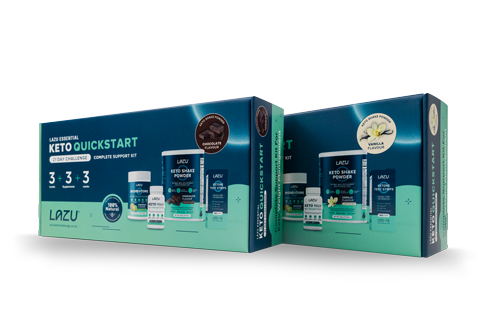
For those seeking to optimize their athletic performance or enhance their general well-being, the concept of ketosis may not be entirely foreign. The ketogenic diet, characterized by high fat and low carbohydrate intake, has gained popularity for its ability to increase ketone levels in the body.
However, the misconception that you must adhere to a strict keto diet to reap these benefits is dispelled by the use of keto supplements. In this article, we will explore the world of ketone supplementation and its potential advantages for athletes, focusing on Lazu Max as a notable product in this category.
Understanding Ketones
Ketones are molecules produced in the liver when the body breaks down fats due to limited carbohydrate intake. These compounds serve as an alternative energy source when carbohydrates are scarce. Ketones can be produced endogenously within the body, but there are also exogenous sources available, such as keto supplements.
Types of Ketones
Two primary forms of ketones are acetoacetate and beta-hydroxybutyrate ketones. Beta-hydroxybutyrate is the predominant ketone used in most supplements due to its stability in this form. These exogenous ketones can significantly elevate ketone levels, effectively mimicking the effects of a keto diet without having to strictly adhere to one.
Benefits of Keto Supplements
- Acceleration of Ketosis: Exogenous keto supplements can facilitate a smoother transition into a ketogenic state. By providing the body with external ketones, it can readily use them as an energy source. Moreover, these supplements can mitigate the symptoms often associated with the initial stages of ketosis, colloquially known as the “keto flu.” These symptoms may include nausea, brain fog, fatigue, and headaches. Taking exogenous ketones along with electrolytes can significantly reduce the risk of these side effects.
- Cognitive Enhancement: Emerging evidence suggests that ketones might enhance cognitive function, improving memory, focus, and learning. Furthermore, ketones may help protect the brain by reducing inflammation caused by increased free radicals.
Possible Side Effects
Although generally safe, keto supplements can occasionally lead to digestive problems, including diarrhea, stomach cramps, or bloating during the initial adjustment period. These side effects are typically temporary and should subside after a few days. If they persist, consult with a healthcare professional to determine if the supplement is appropriate for you.
Impact on Sports Performance
Glycogen is the primary energy source for muscles during physical activity. As exercise begins, the body consumes glycogen for fuel, depleting these energy stores. As glycogen levels diminish, fatigue sets in, impacting athletic performance.
To combat this, some athletes have traditionally relied on carbohydrate loading before endurance events. However, ketone supplements have emerged as a potential alternative or complementary approach to delay muscle fatigue. Research suggests that ketone supplementation before or during exercise can increase plasma ketone levels, providing an additional energy source for muscles. This utilization of ketones before glycogen can prolong the time until glycogen depletion, potentially enhancing endurance.
However, it’s important to note that the scientific consensus on this topic is still evolving, and more research is needed to definitively determine the effects of ketone supplementation on sports performance. Thus far, results are promising but not conclusive.
Do You Need to Follow a Ketogenic Diet?
Ketone supplements are not the sole method for increasing ketone levels. The traditional approach involves adhering to a ketogenic diet. Nevertheless, the relevance of the keto diet in sports nutrition remains a subject of debate.
Endurance athletes often promote the ketogenic diet as a means to boost performance. However, its effectiveness, especially in aerobic exercises lasting less than three hours, is a matter of ongoing research. One practical approach is to follow a keto diet during the off-season to achieve weight loss goals without impacting performance. Then, switch to a higher-carb approach when training for competitions. Consulting with a Registered Dietitian or sports nutritionist can help tailor the best meal plan to your specific needs and activity level.
The Best Ketone Supplement: Lazu Max
Lazu Max stands out as a top-notch ketone supplement in the market. With a generous 1,800 mg of beta-hydroxybutyrate per serving, it effectively elevates ketone levels. Additionally, it contains electrolytes, which can alleviate the initial symptoms of the keto flu, making the transition into a low-carb diet more manageable. Importantly, Lazu Max is free from artificial ingredients, fillers, or unnecessary additives, ensuring a high-quality supplement.
Conclusion
Ketone supplements like Lazu Max offer a convenient and potentially effective way to increase ketone levels in the body without adhering to a strict ketogenic diet. Athletes, in particular, may benefit from these supplements by potentially extending their endurance and reducing fatigue during exercise. However, the efficacy of ketone supplementation in sports nutrition is an area of ongoing research, and individual results may vary. Ultimately, consulting with a healthcare professional or nutrition expert can help you determine the best approach for your specific needs and goals.
